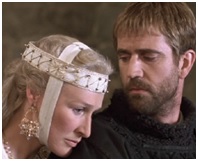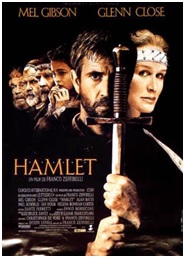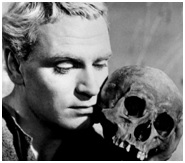|
 |
|
 |
Shakespeare's Hamlet - Success and
Ethics
Hamlet
Key characters Hamlet, prince of Denmark. Claudius, king of Denmark. Gertrude, Hamlet’s mother and Claudius’s wife. Polonius, Claudius’s chief adviser. Laertes, Pilonius’s son. Ophelia, Polonius’s daughter.
Fun facts
The story Hamlet mourns the death of his father whose ghost tells him that he was murdered by his brother, Claudius who
Hamlet pretends madness to discover the truth (upsetting and confusing his sweetheart, Ophelia) and organizes a murder mystery play to see Claudius’s reaction. During the play's murder, Claudius stands up in shock, convincing Hamlet of his guilt. But he puts off killing him, when seeing him praying for forgiveness. Hamlet angrily accuses Gertrude, his mother, of unfaithfulness and mistakenly kills Polonius (Caludius’s chief adviser and Ophelia’s father), thinking him to be Claudius. Realizing the danger he is in, Claudius:
Ophelia is driven mad by the death of her father and drowns herself. Persuaded by Claudius, Laertes, Ophelia’s brother, agrees to kill Hamlet. .At Ophelia’s funeral Hamlet has a duel with Laertes. Claudius secretly poisons:
Laertes reveals Claudius’s plan to murder Hamlet who then kills Claudius before collapsing and dying himself.
Lessons for success and ethics
1. Accept your past Hamlet:
This stops him having a happy life and marrying Ophelia. His mother is happier, because she is much more philosophic about her husband's death, saying: “All that lives must die, passing through life to eternity”. Hamlet only accepts his father's death when he himself is dying. “But let it be”, he says.
2. “To be, or not to be, that is the question” So says Hamlet at the beginning of the most famous speech in English
literature. In it he describes his choice between suicide (“not to be”) or to live on (“to be”) to:
But he:
3. Put thought into good actions Hamlet:
This is what he meant when he says: “Conscience doth make cowards of us all; and thus the native hue [loud cry] of resolution is sickled o’er [meaning cut down] with the pale cast of thought”. Only at the end of the play is Hamlet decisive, saying “readiness is all” before killing Claudius.
4. You are what you think You can change your world by how you look at it. So Hamlet says: “There is nothing either good or bad but thinking makes it so”. He is doomed by his:
This contrasts with his happy days of freedom at university. The great English actor, Laurence Olivier. is pictured right as Hamlet
5. Love and forgiveness bring happiness Hamlet treats Ophelia brutally, professing his love in one breath and then in another telling her to go to a “nunnery” (Shakespeare’s slang for a brothel). He also alienates his mother by refusing to forgive her for marrying Claudius.
6. “To thine ownself be true” This wise advice from Polonius means that you will be happiest, if you:
“We know what we are, but not what we may be”, as Ophelia says.
7. Don’t blindly follow custom and tradition Keep good customs and discard bad ones. Hamlet says bad customs are: “more honoured in the breach than the observance”,. 8. Be cruel to be kind You may have to hurt people to help them. Hamlet says about breaking up his mother’s marriage to the evil Claudius “I must be cruel only to be kind”.
9. Don’t go over the top People won’t believe you, if you over-exaggerate a point - like the actress in the murder play about whom Gertrude says: “The lady doth protest too much, methinks”.
10. Find true friends Horatio, a fellow university student, is a true friend to Hamlet, because he:
Hamlet loves him in return, bearing him in my “heart of heart” (leading to today’s expression ‘in my heart of hearts’).
11. There’s method in the madness This expression (meaning something might seem mad but there’s a good reason for doing it) comes from Polonius saying to Hamlet: “Though this be madness, yet there is method in’t [in it]”. 12. Be responsibly imaginative Hamlet has the most active imagination of any of Shakespeare's characters, seeing his dead father “in my mind’s eye”. But he learns that his imagination must be educated by the responsible maturity shown by Horatio who shows his perceptiveness by describing the ghost of Hamlet’s father as: “more in sorrow than in anger”. 13. Be brief and listen “Brevity is the soul of wit”, Polonius says (wit meaning here skill). He also advises to listen much more than you talk: “Give every man thine ear but few thy voice” 14. “Neither a borrower nor a lender be” This advice of Polonius to his son, Laertes, emphasizes the dangers of:
15. Accept Fate As the American President Abraham Lincoln (a big fan of Hamlet) believed, we are largely controlled by events (or "a divinity" - see below). There’s a divinity that shapes our ends, rough-hew [i.e. roughly shape] them how we will, Hamlet says
Key quote on objectives and vision We know what we are, but know not what we may be, Ophelia.
Key quote on strategy Readiness is all, Hamlet.
Key quotes on happiness To thine ownself be true, Polonius. To be, or not to be, that is the question, Hamlet.
Key quotes on communication Brevity is the soul of wit, Polonius (wit meaning skill). Give every man thine ear but few thy voice, Polonius. Words without thoughts never to heaven go, Claudius.
Key quote on finance Neither a borrower nor a lender be, Polonius.
Key quotes on ethics Conscience doth make cowards of us all, Hamlet. There is nothing either good or bad but thinking makes it so, Hamlet.
Key quotes on relationships To the noble mind rich gifts wax poor when givers prove unkind, Ophelia The lady doth protest too much, methinks, Gertrude. I must be cruel only to be kind, Hamlet
Key quote on creativity In my mind's eye, Hamlet (talking about his imagination).
Key quote on society Something is rotten in the state of Denmark, Marcellus, a royal guard.
Key quote on stress and
pain
Key quote on success Our wills and fates do so contrary run that our devices still are overthrown; our thoughts are ours, their ends none of our own, Player King.
Key quote on change There’s a divinity that shapes our ends, rough-hew [i.e. roughly shape] them how we will, Hamlet |
|
|
||
|
|
|
||
|
||
| Copyright © wisdomtowin.com All Rights Reserved | ||
|

















